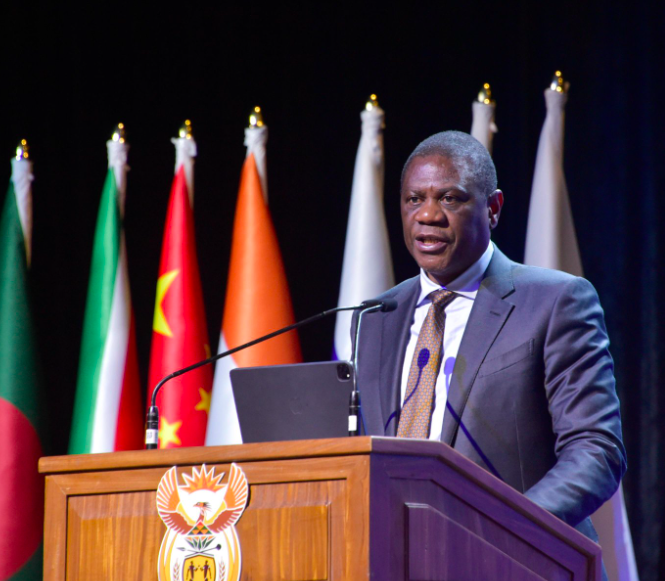Cape Town – The BRICS New Development Bank (NDB) has approved over R20 billion ($2.3 billion) in loans to support South Africa’s infrastructure development, marking a significant boost for the country’s energy and transport sectors.
Deputy President Paul Mashatile expressed his gratitude for the bank’s commitment during an Energy Seminar held at the Cape Town International Convention Centre on Saturday.
Mashatile highlighted the NDB’s pledge of US$5.6 billion in loans to South Africa over the past eight years, with a recent approval of $2.3 billion dedicated to 10 renewable energy projects.
“I want to express my gratitude once again for the bank’s pledge, and specifically for the promises made regarding the bank’s assistance for South African infrastructure investment. In this regard, we take note of the US$5.6 billion in loans extended to our country over the last eight years,” Mashatile said.
Deputy President Paul Mashatile delivers a keynote address at the BRICS 9th Annual New Development Bank Energy Seminar under the theme: “Securing South Africa’s Future”.#NDBAM24 pic.twitter.com/fbObHSfMDA
— South African Government (@GovernmentZA) August 31, 2024
These initiatives include solar PV, wind, hydropower, biomass, and hybrid systems with storage, which are expected to add 2.8GW of power to the national grid and cut annual CO2 emissions by over 4 million tonnes.
Mashatile underscored the importance of the bank’s investment in renewable energy, which aligns with South Africa’s commitment to expanding its energy generation capacity and achieving a sustainable, low-carbon future.
The deputy president also welcomed the NDB’s plans to assist Transnet in resolving freight rail infrastructure deficiencies, describing the project as critical to enhancing South Africa’s global competitiveness and facilitating economic diversification.
“We also appreciate the bank’s plans to assist Transnet in resolving the deficiencies in freight rail infrastructure. The Transnet project in particular is of utmost importance in guaranteeing a goods system that is internationally competitive, allowing for the continuous expansion and diversification of the country’s economy,” the deputy president said.
However, he acknowledged existing challenges, including the slow disbursement of funds for authorised projects. He assured delegates that he has discussed these issues with Finance Minister Enoch Godongwana, who has committed to expediting the payment process.
In his speech, Mashatile also applauded the appointment of former National Treasury official Monale Ratsoma as the NDB’s Chief Financial Officer and Vice-President. He expressed confidence in working closely with Ratsoma to ensure that the bank’s $3 billion commitment at the recent BRICS Summit is realised, particularly in support of South Africa’s energy strategy.
“We are also impressed that the bank has appointed former National Treasury official Mr Monale Ratsoma as its Chief Financial Officer and Vice-President. We will work with you to ensure that the pledge that the bank made of US$3 billion at the BRICS Summit comes to reality because it is focused on supporting our energy strategy,” he said.
Mashatile emphasised South Africa’s eagerness to learn from the experiences of other BRICS nations in scaling up renewable energy capacity, modernising grid infrastructure, and managing energy transitions.
He noted the successes of China, India, Brazil, and Russia in these areas and expressed hopes to adopt best practices for private sector participation, financing mechanisms, and socio-economic management of energy transitions.
Hear from Michelle Phillips, Group Chief Executive Officer, Transnet SOC Ltd on how NDB’s loan of 5-billion-rand will help solve some of the infrastructure challenges in South Africa’s rail network and also bring in private sector operators.@follow_transnet pic.twitter.com/eB5rzkfb3g
— New Development Bank (@NDB_int) August 30, 2024
“We hope to gain insights into effective models for private sector participation in transmission infrastructure development; strategies for balancing grid stability with the integration of variable renewable energy sources; innovative financing mechanisms for large-scale energy projects and best practices in managing the socio-economic aspects of energy transitions.
“Specifically, one of the lessons we are learning from one of the BRICS Member Nations is that they have invested in the creation of new cities as a method to eradicate poverty. We are of the same opinion that it is imperative to allocate resources towards the construction of new cities in Africa in order to alter the spatial perspective of our cities,” he said.
“As we collaborate with the NDB, we will invest in new cities in response to today’s realities, which are growing urbanisation, migration, climate change, poverty, unemployment, and pandemic management. The future is in the cities.”
Mashatile also outlined ongoing government reforms, including the unbundling of Eskom into separate entities for generation, transmission, and distribution, which aims to improve efficiency and attract investment in the energy sector.
The government has also allocated R254 billion for Eskom’s debt relief over the next three years, a measure intended to stabilise the utility and enable critical infrastructure upgrades.
Follow African Insider on Facebook, Twitter and Instagram
Picture: X/@GovernmentZA
For more African news, visit Africaninsider.com
Compiled Betha Madhomu


